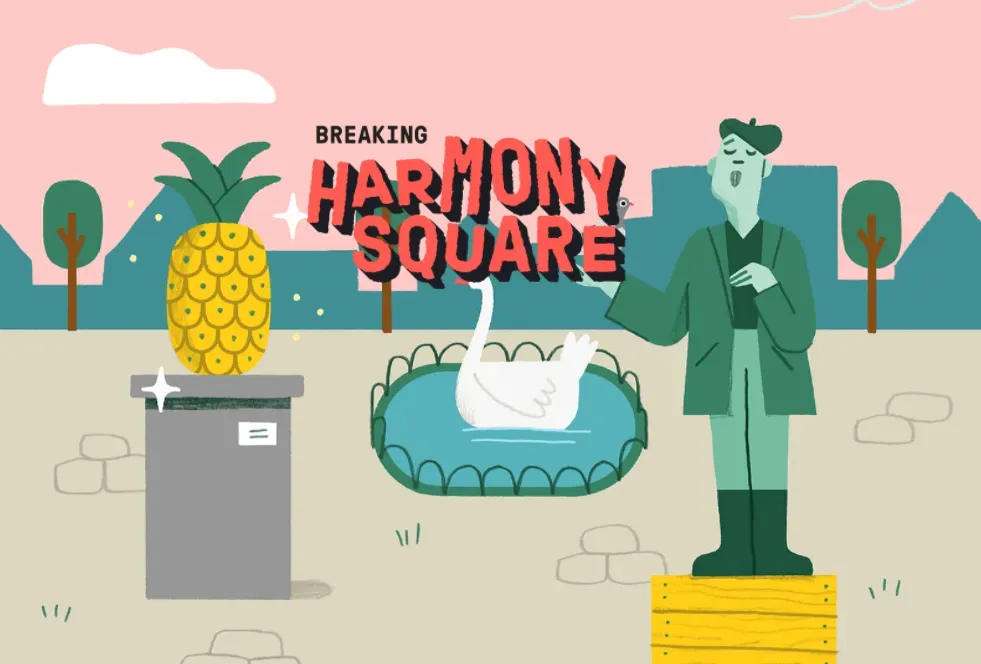Learning to Troll for the Good of Society
What destroying a small town taught me about misinformation

Video games have an incredible potential to improve society. They have been used to help people overcome phobias, boost productivityand to solve cutting edge scientific problems.
As someone who writes about misinformation online, it was only a matter of time before I stumbled across Breaking Harmony Square.
Developed by researchers at the University of Cambridge, Harmony Square was designed to ‘pre-bunk’ political misinformation. Its creators hope that by familiarising players with the techniques used to spread misinformation, they might be inoculated against it in the future.
I played through Breaking Harmony Square and reached out to Dr. Jon Roozenbeek, one of its creators, for his take.
The Game
The game itself is a short text-based game comprised of four chapters, each focusing on a different aspect of disinformation campaigns.
When you begin, you are informed you have a new job as Chief Disinformation Officer. Your job is to cause discord in Harmony Square — a town famous for its living statue, its majestic pond swan, and its love of pineapple pizza.
By making simple choices throughout the game, you slowly but surely undermine public discourse. As you do, you cover four key techniques common in disinformation campaigns: trolling, emotional manipulation, artificial amplification and, conflict escalation. Ultimately reaching beyond the online space and causing real consequences for the town.
Overall, it’s a simple concept executed cleanly and with good humour. The real question is whether it succeeds in its goal of protecting players against disinformation.

The Facts
Before starting, the game asks you to rate the reliability of a selection of social media posts. These range from: “US President Joe Biden argues for childcare and free university…” to “What would you do if you discovered that your child is a Homo sapiens?”
After playing, you are asked the same questions.
The purpose of Harmony Square is to improve the player’s ability to identify unreliable sources of information. The questionnaire is part of a continuing effort to monitor its effectiveness.
It uses a technique known as ‘prebunking.’ By exposing players to mock misinformation, they can build psychological resistance in the real world. It is essentially a mental vaccine.
Inoculation theory and prebunking are not new ideas, but the strength of Harmony Square is its generalisability.
According to Roozenbeek:
“Traditionally, inoculation theory focuses on individual arguments, let’s say climate change or vaccinations… It’s much more effective and potentially much more scalable if instead you focus on manipulation techniques.”
And it works.
The data shows that players were able to identify manipulative social media posts much more reliably after playing Breaking Harmony Square. They were also far less likely to share misinformation on social media.
As the creators write in their report:
“In this study, we find that people who played Harmony Square rated manipulative social media posts making use of the above techniques as less reliable after playing, were more confident in their ability to spot such content, and importantly, were less likely to report to share it in their social network. This finding held for both “real” manipulative content that has gone viral online in the past, as well as for “fictional” content that participants in our study had never seen before.”

The Feelings
Despite its cute aesthetic, I felt uncomfortable in Harmony Square.
Towards the end of the game, it all gets a bit Lord of the Flies. It’s not physically violent, but it cuts a bit close to the bone. The local anchor-man, Ronald Bordeaux (see what they did there?), amplifies your stories by overreacting with indignation. Meanwhile, political parties scramble to pick a stance on your manufactured issues. In times where we see these tactics employed daily, it is uncanny to experience them from the other side.
The saccharine world makes the experience all the more uneasy. It feels like you’ve committed arson in Animal Crossing or detonated a bomb in Stardew Valley. It’s brilliant.
It’s also deliberate. Roozenbeek once again reaches for the vaccine analogy:
“When you get the COVID vaccine, you will feel a little bit bad for a couple of days. If you extend that metaphor to misinformation, it’s the same thing, more or less… Feeling morally ambiguous about destroying this poor little village has cognitive benefits in the sense that you remember it better. That might mean, in theory at least, that the effects of that are longer lasting.”
I learned a lot playing Breaking Harmony Square. Not least that you can buy likes on Twitter for next to nothing.
More importantly, I learned something about myself. I had underestimated how susceptible I was to manipulation. Indeed, since playing I have felt the mental vaccine at work. When getting riled up about a post on social media, I more regularly find myself asking: “Who does this message benefit?”
There are times when we should be angry. There are issues we should be angry about. But righteous fury can be easily manipulated to drown out reasonable debate.
Even if you agree with the content, it’s presentation may do more harm than good. Although it may feel like you are heroically baring the standard, you may just be damaging the discourse surrounding the issues that are important to you.
So be careful out there. And, if you must share something on social media, share an article that, rather than whip you into a frenzy, made you pause for thought.
If you enjoyed this story and want to give Breaking Harmony Square a go, you can play it for free, here.
You can also play its predecessor Bad News, here.
You can watch my full interview with Dr. Roozenbeek, here.